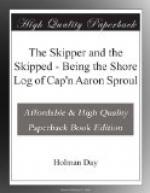The three churches in town came into the project heartily. They would “dinner” hungry strangers in the vestries, and also turn an honest penny. The Smyrna Ancient and Honorable Firemen’s Association, Hiram Look foreman, was very enthusiastic. A celebration would afford opportunity to parade and hold a muster.
The three uniformed secret societies in town, having an ever-lurking zest for public exhibition behind a brass-band, canvassed the prospect delightedly. The trustees of the Agricultural Fair and Gents’ Driving Association could see a most admirable opening for a June horse-trot.
In fact, with those inducements and with motives regarding the “surplus” spurring them on secretly, all the folks of Smyrna rose to the occasion with a long, loud shout for the celebration—and suggested that the “surplus” be expended in making a holiday that would be worth waiting one hundred years for.
After that shout, and as soon as he got his breath, the voice of First Selectman Aaron Sproul was heard. He could not make as much noise as the others, but the profusion of expletives with which he garnished his declaration that the town’s money should not be spent that way made his talk well worth listening to.
It was then that the bear-baiting began.
Every society, every church, every organization in town got after him, and Hiram Look—a betrayal of long friendship that touched the Cap’n’s red anger into white heat—captained the whole attack.
The final clinch was in the town office, the Cap’n at bay like the boar in its last stronghold, face livid and hairy fists flailing the scattered papers of his big table. But across the table was Hiram Look, just as intense, the unterrified representative of the proletariat, his finger jabbing the air.
“That money was paid into the treasury o’ this town by the voters,” he shouted, “and, by the Sussanified heifer o’ Nicodemus, it can be spent by ’em! You’re talkin’ as though it was your own private bank-account.”
“I want you to understand,” the Cap’n shouted back with just as much vigor—“it ain’t any jack-pot, nor table-stakes, nor prize put up for a raffle. It’s town money, and I’m runnin’ this town.”
“Do you think you’re an Emp’ror Nero?” inquired Hiram, sarcastically. “And even that old cuss wa’n’t so skin-tight as you be. He provided sports for the people, and it helped him hold his job. Hist’ry tells you so.”
“There ain’t any hist’ry about this,” the selectman retorted with emphasis. “It’s here, now, present, and up to date. And I can give you the future if you want any predictions. That money ain’t goin’ to be throwed down a rat-hole in any such way.”
“Look here, Cap’n Sproul,” said the showman, grinding his words between his teeth, “you’ve been talkin’ for a year past that they’d pushed this job of selectman onto you, and that you didn’t propose to hold it.”
“Mebbe I did,” agreed the Cap’n. “Most like I did, for that’s the way I feel about it.”




